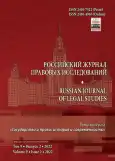Disconnecting Russia from the SWIFT System: Possible Legal Risks
- Authors: Sedova D.A.1
-
Affiliations:
- Law Office No. 31 "Asnis & Partners" of the Moscow City Collegium of Advocates
- Issue: Vol 9, No 2 (2022)
- Pages: 81-86
- Section: Criminal law and process
- Submitted: 27.05.2022
- Accepted: 27.05.2022
- Published: 18.07.2022
- URL: https://journals.eco-vector.com/2410-7522/article/view/108276
- DOI: https://doi.org/10.17816/RJLS108276
- ID: 108276
Cite item
Abstract
There has been talk for a long time about the possible disconnection of the Russian Federation from the SWIFT system. On one hand, it is a promising vector of development, because it allows the Russian Federation to advance in the digital market. It opens opportunities to offer alternatives to existing foreign technologies and systems, and introduce fintech into the companies’ activities. On the other hand, the national system is currently vulnerable to foreign digital giants, among which, of course, are the United States and China. External developments and technologies may harm national systems in the near future, which in turn may violate the right of the Russian Federation to digital sovereignty. How relevant the issue of digital sovereignty is now can be judged by how many states are trying to limit the influence of external actors in every possible way. These states include Austria, Germany, and some other EU countries. Therefore, the issue of ensuring national security and protecting digital sovereignty is currently critical, and will require a definite answer in the near future.
Keywords
Full Text
About the authors
Daria A. Sedova
Law Office No. 31 "Asnis & Partners" of the Moscow City Collegium of Advocates
Author for correspondence.
Email: darya.sedowa@yandex.ru
SPIN-code: 9415-1484
bachelor of law
Russian Federation, 11, Novinsky Boulevard, Moscow, 121099References
- The concept of the digital state and the digital legal environment: monograph / NN Chernogor, DA Pashentsev, MV Zaloilo, etc.; under the general editorship of NN Chernogor, DA Pashentsev. Moscow: Institute of Legislation and Comparative Law under the Government of the Russian Federation: Norm: INFRA-M, 2021. 244 p. (In Russ.).
- Nikonov VA, Voronov AS, Sazhina VA et al. Digital sovereignty of the modern state: content and structural components (based on the materials of expert research). Bulletin of Tomsk State University Philosophy. Sociology. Political science. 2021;(60):206–216. (In Russ.).
- Couture S, Toupin S. What does the concept of "sovereignty" mean when reffering to the digital? International organisations research journal. 2020;15(4):48–69. (In Russ.).
- Maurer T, Skierka I, Morgus R. Technological sovereignty: missing the point? 7th International conference on Cyber conflict: Architectures in cyberspace (CyCon). 2015. P. 53–68.
- Gavrilov EO. Digital sovereignty in the context of globalization: philosophical and legal aspects. Bulletin of KemGU. Humanities and social sciences. 2020;4(2):146–152. (In Russ.).
- Krasinsky VV. Protection of state sovereignty: monograph. Moscow: Norm, 2017. 790 p. (In Russ.).
- Leontieva LS, Kudina MV, Voronov AS et al. Formation of national digital sovereignty in the conditions of differentiation of spatial development. Public administration. Electronic bulletin. 2021;(84):277–299. (In Russ.).
- Kudratov M., Pechegin D.A. Transfer of assets and illegal withdrawal of capital: actual problems of counteraction // Journal of Russian Law. 2020. № 1. P. 101–111.
Supplementary files








